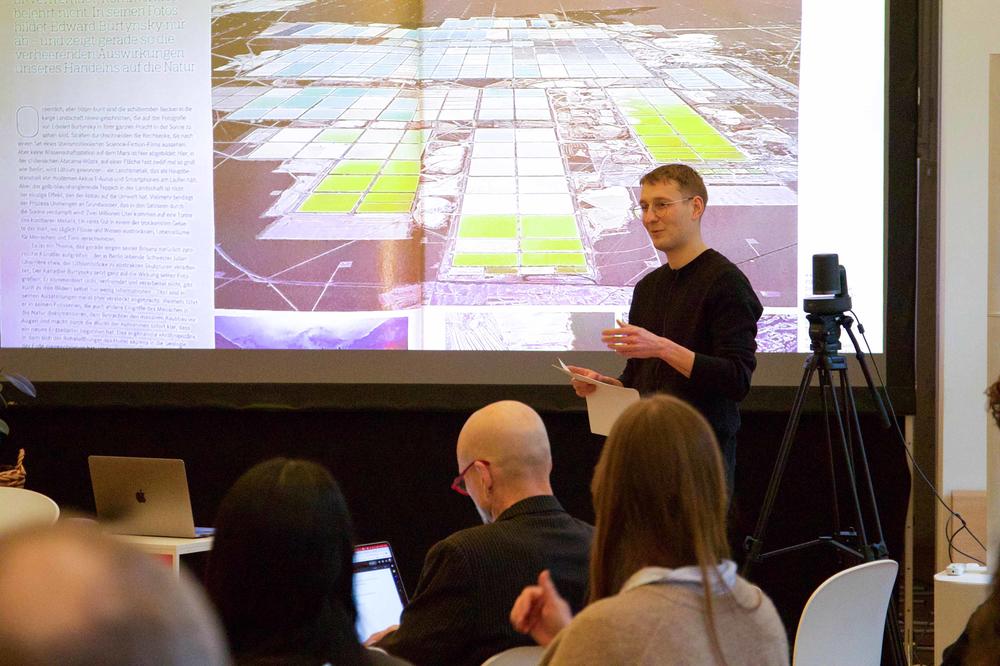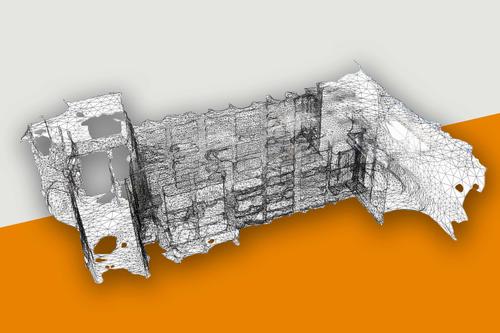metaLAB: Where Freie Universität Meets Harvard
Researchers and students are exploring new digital solutions for the arts and humanities in a one-of-a-kind experimental knowledge-design lab called metaLAB (at) FU Berlin
Mar 11, 2024
metaLAB (at) FU aims to use digital solutions to make existing knowledge structures visible, as well as to discuss and critique such structures.
Image Credit: B4 Tomorrow, Transformation of the Archive into a 3D mesh.
Take a socially relevant problem. Add to that a group of experts from the humanities and cultural institutions who are bold enough to explore new methods together. Their aim is to find digital solutions as prototypes. With enough courage to take risks that might fail and in hope of changing society for the better, they dare an experiment. That is how metaLAB (at) FU functions as a collaborative effort between Freie Universität Berlin and Harvard University.
“We are interested in how academia fundamentally impacts society,” says Annette Jael Lehmann, a professor of visual culture and head of the degree program in culture and media management at the Institute of Theater Studies at Freie Universität Berlin. Following a fellowship at Harvard in 2021, she brought the metaLAB cooperation to Berlin. The original metaLAB (at) Harvard had been founded at the American Ivy League university in 2011 by Professor Jeffrey Schnapp.
“We work together in a radically experimental way,” says Lehmann. “By that I mean that we develop new problem-oriented approaches through transdisciplinary cooperation, and there is always a digital aspect.”
Innovative Approaches to Collaborative Research
But what does that mean specifically? Lehmann says that since each project is unique, it is not possible to explain their work in general terms. To illustrate the principle, Lehmann chose the example of “B4 Tomorrow,” a project that was concluded in the fall of 2023. When “B4” is spoken, the term could mean “before” or “be for” (“stand for”). In the project researchers worked with representatives of the Eyak and Sugpiaq, two indigenous ethnic groups in Alaska, who for the past 10,000 years have been passing on their customs and traditions to the next generation via oral and, to a lesser extent, written stories. Both their everyday and sacred objects have a high symbolic value that is culturally edifying. Lehmann describes the socially relevant problem for the project as follows: “Today many of these material testimonies are stored as colonial appropriations from the nineteenth century in Berlin, in the archives of the Ethnological Museum, thousands of miles away from the people whose cultural heritage they belong to.”
The aim of B4 Tomorrow was to make the cultural assets of the Eyak and Sugpiaq available to them again and to work with members of the Eyak and Sugpiaq to determine the cultural significance of these objects before the knowledge is lost forever. According to Lehmann, “As a small mobile team from metaLAB, we worked with staff from the Ethnological Museum in the Humboldt Forum to conduct workshops including representatives of the indigenous groups where we attempted to contextualize objects such as baskets or fishhooks together.”
To make this knowledge available to as many participants as possible, Professor Kim Albrecht, a data visualization specialist from the metaLAB team, developed a software platform that combines an online archive and a social medium. Via this platform users can communicate with each other digitally, they can correct or change the entries for colonial appropriations, and they can align the cultural objects with their own stories. The platform operates in accordance with the CARE Principles for Indigenous Data Governance: sacred and ritual cultural assets are not publicly accessible.
Lehmann notes that in the B4 Tomorrow project finding a suitable digital solution for a prototypical problem in its specific context proved to be an immense challenge. In the end the platform will only be able to be used by other museum archives to a limited extent because the problem is far too complex and individual. In Lehmann’s words, “We see ourselves as a knowledge design laboratory that works as a mobile team, analyzes problems, and then creates individual solutions to visualize information. We dare to undertake transdisciplinary experiments that enable tailor-made solutions, and we make them accessible to a larger, non-academic public.”
The 3D scan shows the depot of the Ethnological Museum in the Humboldt Forum as a network structure.
Image Credit: metaLAB visualization (Kim Albrecht)
Building a Strong Network
Through metaLAB Freie Universität Berlin and Harvard have already carried out numerous projects and exhibits in international museums and cultural institutions. They include a visualization of digital data streams in cities, a video project about the transfer of cultural knowledge in Southeast Asia, and a European traveling exhibit about the historical analysis of artistic practices in the 1970s at the California Institute of the Arts, a highly regarded art school.
With its experimental approach involving researchers and students at both universities, metaLAB occupies a special position in the research landscape of Germany and the United States. One of its goals is to contribute to bringing about a new sense of identity for research and academia. Lehmann says, “In the future, research and academia should be much more oriented toward the general public and toward solving social problems.”
In spite of its success, metaLAB is continually faced with challenges. The combination of experimental and application-oriented production of knowledge and culture is by no means accepted as a given. In this regard, Lehmann notes that having Harvard as a cooperation partner is an asset, as is the group’s strong network of experts. “The fact that we at Freie Universität can build on this is a great privilege and sets us apart in Germany.” Indeed, the success of the experimental “pop-up lab” is spreading across Europe, and according to Lehmann, more and more universities are interested in collaborating.
At Freie Universität Berlin the innovative collaboration at metaLAB is strengthened by its cooperation with the Temporal Communities Cluster of Excellence. In addition, it is considered groundbreaking within selected projects in Una Europa, an alliance of eleven leading research universities in Europe, including Freie Universität. As Lehmann stresses, “Working in small transdisciplinary teams that are newly put together each time sets us apart; metaLAB is a unique experimental space for the changing role and relevance of academia in the digital age.”
This article originally appeared in German in the Tagesspiegel newspaper supplement published by Freie Universität Berlin.


